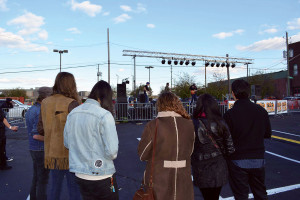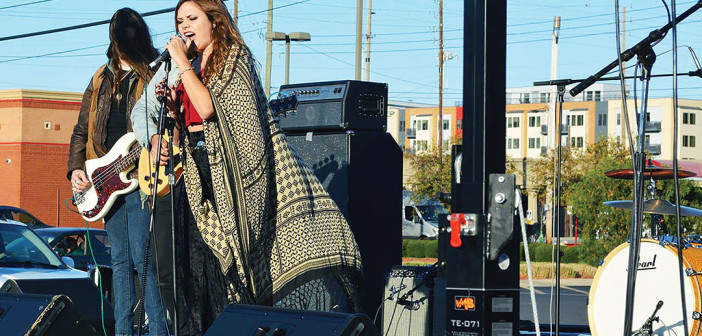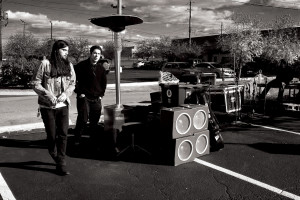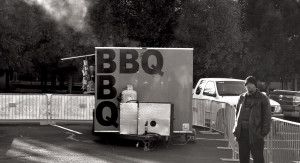The Dead Feathers’ band van was gutted long ago — the back seats ripped to make space for double-neck guitars, tambourines and elicit paraphernalia.
“We’re really good at Tetris,” said the guitarist, throwing his weight against the cargo. West-side Chicago woke, rubbing their eyes and peering through gated windows to watch the commotion below.
Manufactured in a bygone era, the van is agile and built without regard to modern regulations. It’s capable of well over 90 miles per hour, despite its girth. This thing bull-rushes traffic, losing a roar that sends lesser vehicles scurrying. Hyundai drivers grimace and weep as we pass. They remember the last time they heard that bellow, when the Dead Feathers’ van “love-tapped” one of their kind.
“Pro-tip,” said the bassist, clutching his Dr. Pepper. “If someone needs to puke, pull over. Don’t keep going at 90. It all sprays back.”
The band van lets out a terrible howl and breaks from Chicagoland, puncturing the smog to reveal a landscape of RV nomads, gas-station royalty and a billboard that cries, “HELL IS REAL.”
Due to its girth — multiplied by three long-haired rockers, a humble reporter, amps and the unlabeled bottles of flammable liquid lining its interior — the van is a fighter-jet missile at max velocity.
The time is 3:49 p.m. The Stoner Rock BBQ starts at 4:20. And the Dead Feathers’ band van is more than an hour drive from Indianapolis.
…
Marissa Allen is in costume. The sky drops. Temperatures turn sinister over the city’s outline, fogging brewery windows and disturbing swaddled babes. The band van is emptied — albeit a few Doritos. The drummer arrived mostly intact, and the guitarist’s aquatic moss ball made the trip unscathed. In these conditions, it’s unclear how long either will survive.
The opening band takes the stage and sends classic-rock waves through the White River. Indy’s youth, with quiet eyes and knitted sweaters, stagger out of bars and potholes, alleyways and warehouses. They shield their eyes, grope their short beards.
Despite the cold, Marissa’s stomach shows and her clothing is thin: Free-Love Era throwback. She draws black dots beneath her eyes — hippie war paint. Her breath smells of banana and doppio con panna.
“She will take them far,” some critics say.
The Stoner Rock BBQ is staged in a parking lot wasteland on the outskirts of Indianapolis. An Arby’s lies adjacent, haunted by drunken middle-aged women and an employee who longs to be a rock star. Tow Yard Brewing Co., the event sponsor, looms overhead. The boundaries are blurred, the fences timid.
There are tassels here, jean jackets, leather.
There are bottle openers, liberal pours, burnt beer, meat vendors and thrashing grease, “good briskets, but fatty.” There is an attendant grabbing me, asking if I’ll be drinking, backing away at my response. There is tension in the porta-potty line, horseshoes, flirtatious locals with missing teeth, police cars with gnashing sirens and posters for Alt 103.3: Indy’s Alternative. All are seized by an ancient duende — a vibe of the collective soul.

The Dead Feathers arrive late at the Stoner Rock BBQ, which featured a set list of rock bands from near and far. The festival ended abruptly when temperatures plummeted and patrons fled.
This is young blood. Very few among the crowd breathed in the ’70s — and those that did are banished to the fringe, hunched over paper baskets filled with pork. They are ignored by all but the wind.
The sun dims over Stoner Rock, and the brewery beckons— the warmth of a crowded bar and rising beer. A table at the back sells relics of bone and string, worn talisman. The merchants hunch over their lot, faces grim.
A gust tears from Chicagoland’s sky, snaking down the gnarled highways, coiling around I-465 and lashing at Stoner Rock. It shivers the clusters of Indy families, smothering the joints of a few genuine stoners and rippling the moss ball’s hideaway.
The Indy gale sways Marissa’s cloak like tentacles of a sea-beast swimming to surface. She looks to the crowd…grabs the mic without a shiver.
“We’re Dead Feathers from Chicago,” she says. “Here’s one to warm you up.”
They rage for about 30 minutes, fingers shaking, crowds swarming in heated clusters — a dark-bearded fat man at the center of it all, surrounded by switches and clocks, nobs labeled by a language only he understands. He will stay here through the night. This is his mass…the brewery, his church. He occasionally glares at the homeless man, the one who’s wheeled his cart to the festival’s edge. A parasite.
Marissa bellows her haunted blues, her threadbare rock. This woman’s voice is purified — although twisted — by the gusts of Lakeshore wind. It roars and softens…writhes in awesome waves through the Indy streets. A crowd is drawn to her siren song, opening their wallets and paying the $10 entry. I kneel at the foot of her stage.
Her cloak spreads, casting a mangled shadow over us. It billows against the amps’ vibes, the great wind threatening to take her. Her eyes water, baptizing the stage — her body framed by a dying sun.
A man drops his cigarette, douses it in beer, laughs and spits in the mess.
…
A precise time was never recorded; but when the Stoner Rock BBQ was done, we all knew it.
A few bands staggered back onstage, but we left them alone to the wind and the fat man and a few leather jackets pawning handfuls of beer tickets.
The show is dead. The joke is over. And the Tow Yard Brewery Co. is quivering with Indiana’s brand of hedonism.
When a movement dies, liquor remains.
Inside, I corner a bartender. She has seven teeth and a T-shirt stretched beyond its comfort. It reads “Grab Our Cans,” great rolls of flesh gnawing at the neckline.
“I need to find the ‘green room,’” I say, leaning in close with a dark whisper. “I’m…with the band.”
Shaken, she guides me through a tunnel system, past a series of iron doors and elaborate security measures. We reach the inner sanctum when she stops, making clear she will go no further.
Steel barrels tower above — thick as prehistoric trees and reaching inches from the ceiling. Buckets lie on their side, stained green with rotting hops. They bleed the stench of sour moss. Marissa and her partner sit in the shadow of it all, a mountain of crushed cans between them.
They leave to fetch the bassist, who has purchased several dozen drink tickets, vowing to use them all.
The brewery is pitched in shade. Orphan lights flicker across my leather-bound notebook — as if I sit in a ring of candles.
Faint cackles from the bar, the patter of young steps, a moan as the building settles.
A voice booms through the abyss.
“Hello, son,” it says. “Are you lost?”
My eyes adjust, and his form takes hold in the void.
Framed by an American flag, his beard drapes over a dove-white tunic. It sways with every roll and pitch of his voice. Outside, the wind scatters.
“Curious,” he says with a gentle smile. “What are you doing back here, writing all alone?”
“I, well, ah, you see,” I say.
He nods, impressed, as though I’ve quoted a great passage from the Vedas.
“I’m not asking for me,” says the white-haired man. “I’m asking for them.”
He steps aside to reveal five children peering through the door. Their eyes wide as harps, they flutter about, begging the old one to return.
“Quiet — quiet down, now,” he says, raising a hand to silence them. It tremors the earth, ripples the steel vessels, threatens to topple them all.
“Music,” he says, taking a great breath. “What a thing, this festival.”
He surveys the brewery. The kids chatter in the doorway.
“When you hear music, some days it becomes part of you…lifts you up and takes you somewhere. Somewhere away from here.”
With a nostalgic sigh, he gazes at these words.
Five hours before, as we tore through the Indy wilderness, Marissa turned to me.
“Do you ever wonder,” she said, “how much of it actually happened…and how much is just the way some person remembers it?”
Back in the present, the bearded man taps my notebook and paces to the window. He clears a hole in the fog and peers to the parking lot. Here is the maker’s tundra, the null of all cosmos. Cracking the door, he inhales the night air, the same air that brought hippie magic a few hours before.
The feeling. The love. The stale beer. The tentacles and fighter-jet missiles. The octopus goddess and siren call. It’s all carried away by the same gale that brought us here, all brought to some nebulous end.
Now, we’re left to ferment. And the staff is making a last call for drinks.
The parking lot is vacant, the wind drifting east. The stars drip black over long-haired men. They stagger home, lifting each other from the sidewalk and stumbling through the diaspora. The homeless man wheels his cart to an alley and sinks against the brick in the pose of a nude. The whispers dim. The candles flicker and fade silent.
Tomorrow, many will awake and wonder if it was anything more than noise.



